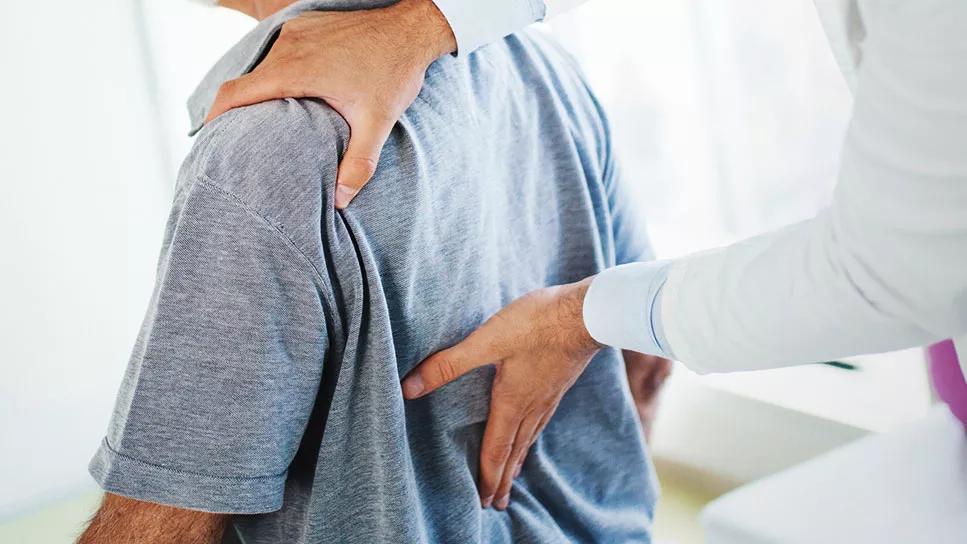It’s always a good idea to let a healthcare provider know about any back pain you’re experiencing, especially if it results from trauma or persists longer than three months

Lately, your back has been acting up. But you were sure it would calm down after a couple of days. Everyone gets back pain once in a while, right? But after a certain point, you start to wonder whether you should continue with the heating pad and ibuprofen or reach out to a healthcare provider.
Advertisement
Cleveland Clinic is a non-profit academic medical center. Advertising on our site helps support our mission. We do not endorse non-Cleveland Clinic products or services. Policy
Pain management specialist and anesthesiologist Kristin Powers, MD, breaks down how to know if your back pain needs medical attention.
A variety of factors can cause back pain. Some people will have a flare-up of back pain with no inciting event. Other times, something very distinct happens, like lifting a heavy object or sleeping in an uncomfortable position. It’s important to take note of when symptoms become worse, are more persistent or start to feel different.
Here are some signs that you should see a healthcare provider about your back pain.
One of the best ways to know if you should see a provider for back pain is to keep track of how long you’ve been feeling the pain. Dr. Powers points out that acute pain will generally last a couple of days to a few weeks, and usually resolves by six to 12 weeks.
“When someone is having acute pain, I think it’s appropriate in the first couple of weeks or even one month to follow up with your primary care physician,” says Dr. Powers. “They’ll help recommend initial options like physical therapy, and maybe some non-opioid medications to help with the acute symptoms.”
If the pain has persisted for three months or longer, this is usually classified as chronic back pain and warrants a visit to your provider’s office.
Advertisement
You should also take note of any accompanying symptoms you may feel in addition to your back pain. You should see a healthcare provider if your back pain is paired with symptoms like:
Another factor to consider is if your back pain started after a specific injury or physical event.
“If you’re having new severe back pain in the setting of any sort of trauma, like a fall or a motor vehicle accident, it’s a good idea to see a healthcare provider so they can perform a thorough exam,” Dr. Powers states. “This way, they can further evaluate the pain and any injuries that may have occurred.”
“Especially as we get older,” she continues, “we are so much more prone to fractures or malalignment. We want to ensure there was not an acute fracture or change in spinal alignment.”
Seeing your primary care physician (PCP) or a healthcare provider is a good first step if you’re experiencing a back pain flare-up, especially if you notice that your pain is reaching a level where your day-to-day activities are affected. But if your pain is severely impacting your ability to function, you should consider heading to the emergency room instead.
“If the pain is so severe that you’re no longer able to walk or you’re having extreme difficulty completing daily activities like moving around your house, making food or showering, a good place to always start is to inform your primary care doctor,” reiterates Dr. Powers.
“Depending on the severity of your symptoms, they may suggest coming to their office for an evaluation or going to the emergency department.”
According to Dr. Powers, a healthcare provider will likely approach your back pain with a combination of treatments like physical therapy and possibly non-opioid medications. But this will depend on the source of the back pain and how you’re reacting to specific treatments.
In general, we think of three sources of back pain. Pain can be caused by just one of these or a combination of different pain generators:
Advertisement
Once your healthcare provider or a specialist has determined what the source of your back pain is, they’ll know how to proceed with treatment options.
“The majority of people will get better in three months with conservative measures like physical therapy and non-opioid pain medication,” Dr. Powers explains.
“If the pain is persistent beyond three months [chronic], that’s when we look at referring a chronic pain physician who can evaluate the pain further, order more advanced imaging if necessary, perform a specialized physical exam and then, consider other options, like injections.”
Pain management specialists can offer additional interventions for back pain, such as:
It’s always a good idea to let your PCP know about any back pain you’re experiencing, but if the pain is a result of a trauma, persists for longer than three months and is impacting your day-to-day life, consider going to the emergency room as well. Care providers may recommend a pain specialist to help treat your pain.
Advertisement
Learn more about our editorial process.
Advertisement

Hanging upside down for any length of time may decompress the tension in your spine

Drinking alcohol can cause nerve pain, dehydration and weight gain, which can all lead to back pain

Your sleep position, immobility, mattress and underlying conditions can all cause morning back pain

Rest may be all you need to get rid of running-related lower back pain

From physical and biofeedback therapy to nerve ablations and blocks, there are many nonsurgical options for managing back pain

Rest, physical therapy, acupuncture and nerve blocks are just a few ways to find relief

Get moving, use cold packs, and try yoga and stretches to ease back pain

Back spasms, shingles and disk conditions can all feel like a burning sensation

Wearing a scarf, adjusting your outdoor activities and following your asthma treatment plan can help limit breathing problems

Your diet in the weeks, days and hours ahead of your race can power you to the finish line

When someone guilt trips you, they’re using emotionally manipulative behavior to try to get you to act a certain way